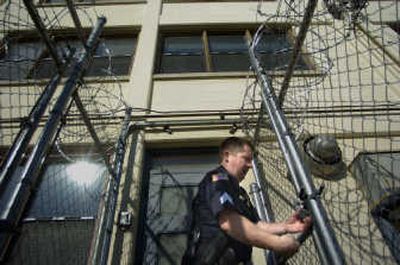Jail sales tax hits the ballots

When Spokane County voters passed a sales tax increase for jails in 1995, officials were shocked. “It’s a huge surprise,” the juvenile jail’s manager at the time said.
The tax, which pays for dozens of jobs at the county jail, Geiger Corrections Center and the juvenile detention center, was approved after voters repeatedly rejected property tax increases for jails. But the county had only preliminary or vague plans for how the money would be used, and three years later most of the new revenue was still unspent, creating a surplus. Some questioned why county commissioners were sitting on it.
As voters contemplate for a fourth time whether to continue paying the one-tenth of 1 percent sales tax for jails, spending the money is no longer an issue. Not even close.
The last of the jail sales tax surplus, which peaked at $8.4 million in 1999, was spent in 2004, according to county figures. By 2000, the county was spending more on positions and other costs than it collected from the tax. “It would be devastating if we didn’t get it renewed,” county CEO Marshall Farnell said.
Ballots to renew the tax, which equals 1 cent on a $10 purchase, were mailed to county voters last week. To be counted, they must be postmarked by March 11. If approved, it would extend the tax for seven years.
Most of the money collected from the tax pays for operating Geiger. In 2007, the $8.2 million the tax raised also helped pay for 29 employees at the county jail, including 24 correction deputies, and nine employees at the juvenile jail – about a fifth of its staff.
Bonnie Bush, the county’s juvenile court administrator, said if the tax is not renewed, there will be less staff to oversee inmates. That could cause safety problems and hurt or eliminate important programs that help troubled youth, Bush said.
“What this pays for is very core stuff,” she said. “There is just so much that is at stake for us.”
If the tax, which expires at the end of the year, isn’t renewed, the county is likely to make cuts and lay off workers, officials said. “We would be facing some serious decisions,” Bush said.
There is no organized opposition to renewing the tax. Former county commissioners Kate McCaslin and John Roskelley, who last year were vocal in their opposition to a proposed new sales tax for emergency communications and Crime Check, support renewal of the jail sales tax.
But there is widespread concern among corrections officials that voters could confuse renewal of the tax with other proposals for new taxes.
Commissioners are considering making a second attempt in May at passing the emergency communications and Crime Check sales tax. And jail leaders are preparing a plan, which could make the November ballot, to build a new jail through property tax increases.